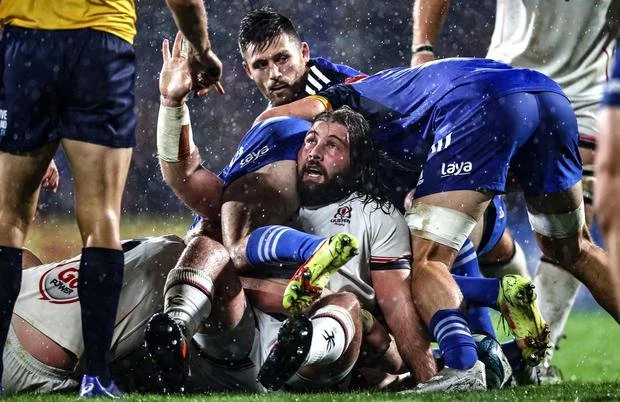A Night of Reminders
A case can certainly be made that Ulster staked their claim as Ireland’s second-best province last season, especially as they bested Leinster home and away. A statement that looked even more fitting as they won their opening two matches of this competition, whilst Munster lost theirs.
And that was very much the tone of this affair, the secondary Ulster looking to wrestle the provincial wreath from Leinster’s collar. The possession-heavy, directness of Ulster was there from the beginning, taking charge of the game. Running at full tilt with rapid pace and going everywhere, apart from through Leinster. A ruthlessly assembled wave of blue made sure of that.
A defence so organised, resolute, and systematic that any time their opposition once had to survey and structure their attack is cut in half. Each tackle a ticking time bomb, with Leinstermen descending on the breakdown like shrapnel. The hard work of the likes of Josh van der Flier, Jason Jenkins, and Dan Sheehan overwhelming Ulster’s own forwards.
Whilst one wave dampened Ulster’s attack, another cascaded from the heavens and bedewed the Kingspan. Like Leinster’s movement, the rain was torrential. And much like Ulster, it fell hard. The ball fell too, numerous times in fact, refusing to stick to the hands of the Ulstermen. It slipped from Aaron Sexton’s grasp as the winger plunged upon the try line. It seemed to escape the clutches of Michael Lowry each time the fullback touched it.
It was, unfortunately for Ulster, one of those nights where every inaccuracy was costly. The Kingspan’s climate can surely take a fair portion of the blame, the rainfall stymying the type of precision that Ulster exhibited at the Parc Y Scarlets last weekend. But the dichotomy between the two sides was clear as day when Leinster launched their first attack of the game.
It’s ridiculously obvious, but nights like that - where the conditions are harsh and unforgiving, unsuited to running rugby - a functioning set piece is vital.
With seven-ish minutes gone Ulster gave them an inch at the scrum and Leinster took a mile by winning a penalty and kicking the ball into Ulster’s 22. There was no patient probing or feeling out process. Leinster went one way, fast and hard, overloaded the other side, and scored through Ryan Baird. Simple, succinct, Leinster.
If Baird’s try was predictable, then well, Dan Sheehan scoring off the back of a maul has become possibly the most predestined outcome in all of the URC. One that is a perfect rendering of the aura of inevitability when Leinster bring play close to the opposition try line. And once again, the requirement of a strong set piece in ugly weather was clear.
Leinster’s ascendency at the scrum blended excellently with Ulster’s handling errors. One compounded the other, and the match seemed further and further out of Ulster’s reach. Doubly so against Leinster, whose aptitude for taking advantage of said errors is unparalleled.
‘What ifs’ are a relentless factor of post-match discussions. What if Ulster’s Emerging Ireland players were available? What if the heavens didn’t open and further thwart Ulster’s attacking style? What if Jacob Stockdale and Rob Herring didn’t leave the field early with an injury? What if Sexton hadn’t knocked the ball on?
The questions are countless and endless, and likely not worth devoting too much time to. If a team takes until the final quarter before they begin to look like their best, then there can be few complaints and questions when the win eludes them.
And that is perhaps the best way of putting it. Strip away the acute and detailed analysis. Leinster adapted to the game and took their chances. They were clinical when they needed to be and accurate when needed also. Ulster weren’t. A 17-point difference, against Leinster, is too much for almost any team to surmount.
Saying that, perhaps Ulster, and some fans, may find a level of contentedness, even if it is blunted with disappointment at what could have been. To go 17-points down at home is depressing, even against Leinster. To scrape back 13-points without conceding one, is admirable. And certainly, a testament to the improved fitness and heart of Ulster and their ability to play in the later stages of the game.
That being said, as aforementioned, it’s useless playing in the latter stages if you don’t turn up for the opening ones. And that was the difference here at the Kingspan. And so, it wasn’t necessarily a reality check, nor a bruising loss for Ulster. But a subtle reminder. A reminder of what they need to reach Leinster and the top; and a reminder of what they need to do consistently to reach the goals worthy of a crop of players this talented.












